Can WTO stop fishing subsidies and protect our marine environment?
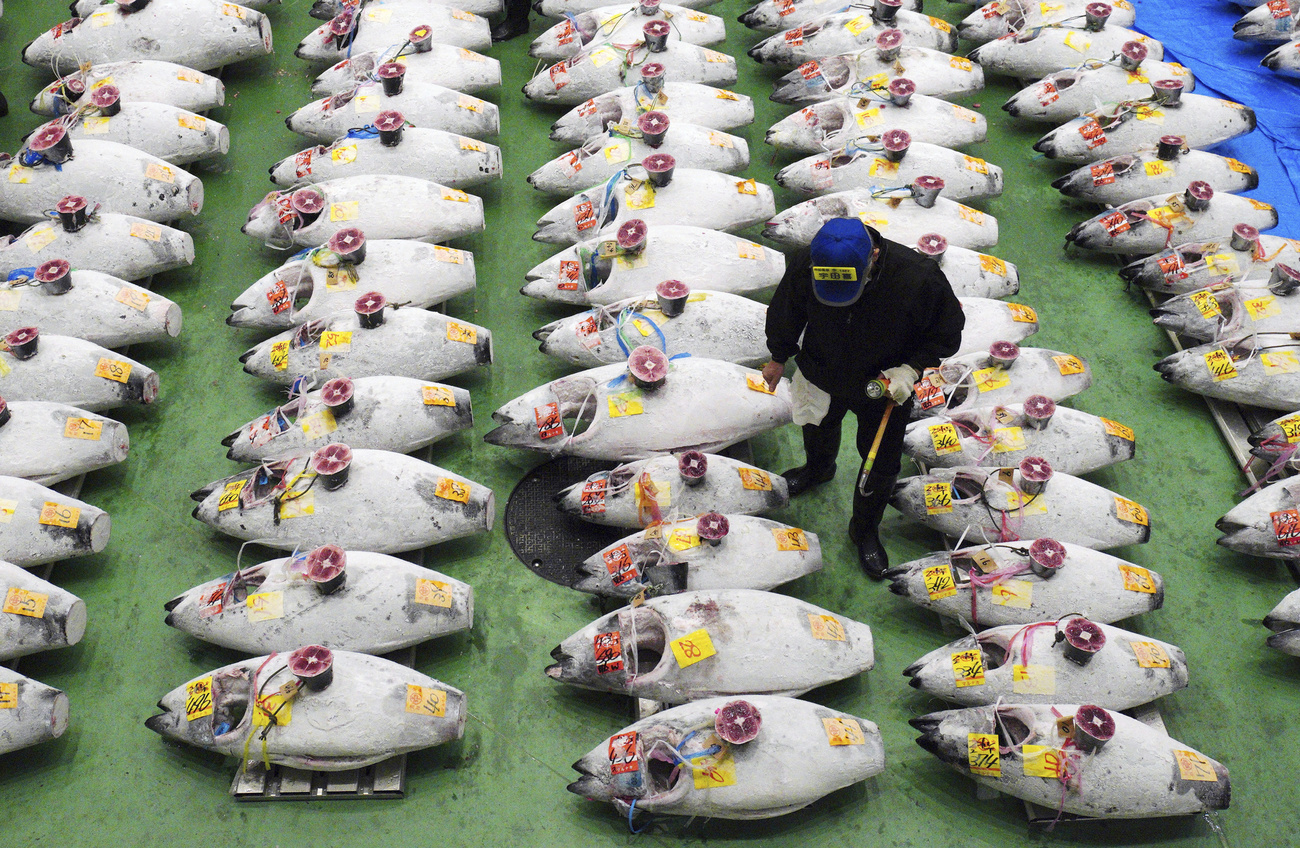
Every year, governments pay billions of dollars to their fishing industries to carry on fishing even though stocks are seriously depleted. The Geneva-based World Trade Organisation (WTO) is holding a ministerial conference on July 15 to seek an agreement on banning harmful fisheries subsidies, a main factor in overfishing. The question is whether WTO’s 164 members will finally be able to resolve this issue, which has divided countries for more than two decades.
Fish are one of the most traded food commodities in the world, and trade continues to grow despite dwindling stocks. Global fish consumption has increased steadily since the 1960s, and global fish production reached its highest level in 2018: 179 million tons with a value estimated at $401 billion (CHF367 billion), according to the Food and Agriculture Organization of the United Nations (FAO)’s report for 2020External link.
Subsidies encourage the fishing industry to catch fish faster than fish stocks can rebuild, damaging marine resources and ecosystems. The proportion of fish stocks at a biologically sustainable level decreased from 90% in 1974 to 65.8% in 2017 due to the overexploitation.
The UN’s target Sustainable Development Goal (SDG) 14.6External link aims to prohibit certain forms of fisheries subsidies which contribute to overcapacity of fishing fleets and overfishing, as well as eliminate subsidies that contribute to illegal, unreported and unregulated fishing, and to refrain from introducing new such subsidies by 2020.
“The existence of harmful forms of fisheries subsidies remains one of the principal factors that contribute to such overfishing and depletion of fish stocks,” explains the FAO report.
How do subsidies work?
Harmful subsidies that enable overfishing can, for example, minimise fuel costs for fishing vessels. They allow access to distant fishing areas and a fuel-incentive method to catch fish by dragging heavy nets along the sea floor. The huge scale of the fisheries trade-distorting interventions is affecting the sustainability of the marine environment, and undermining the livelihoods of small scale and artisanal fisheries.
The United Nations Conference on Trade and Development (UNCTAD)External link estimates annual global fisheries subsidies at $35 billion. Around $20 billion of public money is spent directly on harmful fisheries subsidies, leading to overfishing.
The top five subsidisers: China, the European Union, the United States South Korea and Japan, contribute 58% of the total estimated subsidies, reports a journal of ocean policy studies, Marine PolicyExternal link.
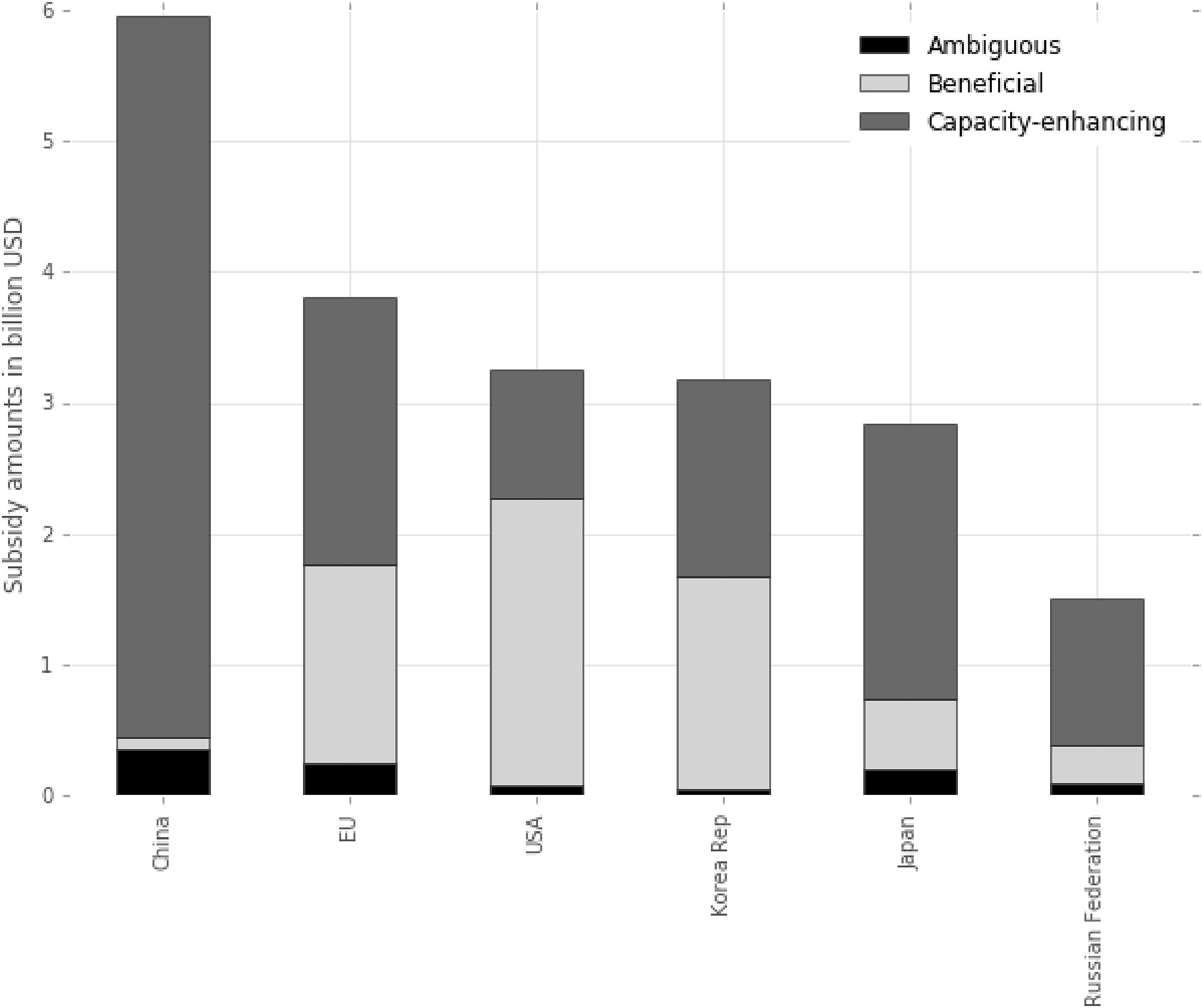
“It is clear what is at stake here: Ending the economic and environmental madness involved in subsidising industrial fleets to travel far and wide in pursuit of diminishing stocks of fish; spending between $20 and $30 billion of public money on this folly when those funds could be so much better spent on helping coastal communities build a resilient future,” said Peter Thomson, the UN Secretary General’s Special Envoy for the Ocean, at a webinar organized by Friends of Ocean Action and the World Economic Forum two weeks ahead of the WTO ministerial meeting.
How can the WTO agreement eliminate harmful subsidies that cause overfishing in practice, while at the same time protecting artisanal fishermen?
Diverse political interests
The clear link between fisheries subsidies and overfishing was already clear in the 1980s in scientific data. Some WTO members, like New Zealand and the US, brought concerns about the damage caused by fishing subsidies, and the possible benefits of eliminating them, to the WTO in the 1990s.
However, in a multilateral trading system where economic interests take precedence, negotiations with an environmental perspective are long overdue. All countries, especially those with large subsidies, will defend their national interests because they want to protect their own industries. The EU and Japan, both of whom have major fishing fleets, believe that while problematic subsidies should be prohibited, other subsidies they claim help promote sustainable development in the fishing sector should be permitted.
A legally binding instrument which advances sustainable fishing and supports fishing communities requires clarity and precision, and WTO members are finding it difficult even to agree on the definition of “fish”, “fishing” or “vessel” in the text of the proposed agreement.
“A WTO agreement on fisheries subsidies is more than an agreement on trade policy,” says Didier Chambovey, Ambassador to the WTO of land-locked Switzerland. “The agreement would not have any economic impact on Switzerland, neither would it impact its trade policy, [but] Switzerland supports a meaningful conclusion of the negotiation on fisheries subsidies in line with the SDGs,” he told SWI swissinfo.ch. “Concluding a meaningful multilateral agreement on fisheries subsidies would also put the WTO back on track with 21st century challenges and reinvigorate the WTO negotiating function.”
“Social impact is always an important part of all trade negotiations to benefit people. Environment policy and environment protection is a secondary focus, not the main driver of focus,” explains Carl Gustaf Lundin, Managing Director of the non-profit Mission Blue, and former Director for the International Union for Conservation of Nature (IUCN) Global Marine and Polar programme.
The Asia-Pacific Economic Cooperation (APEC), which includes China and Japan, has tried to deal with distorting fishing issues since 1991, but has no treaty obligations. The EU or the Trans-Pacific Partnership Agreement (TPP), which includes Japan and the US, do have regulatory regimes on harmful fishing. But regional agreements can differ widely, making it difficult to bring bilateral or regional legal frameworks on distorting fisheries issues into the multilateral system.
The revised draft agreement of 30 JuneExternal link still shows numerous gaps among member states. In particular, there is a disagreement on the “Special Differential Treatment” in Article 3. Whilst the article promotes sustainable activities, some countries want an exemption for illegal fishing, or a transition period for developing countries.
“Some developing Members, however, were concerned about how this would affect their subsistence, artisanal and small-scale fishers,” explainsExternal link the Chair of negotiations, Ambassador Santiago Wills of Colombia.
The number one subsidiser and a developing country, China, didn’t answer SWI’s question about China’s position on the fisheries agreement. But the last public record, dating back to June 2019 supports “a cap-based approach” which accommodates constraints as well as flexibilities. “Appropriate and effective special and differential treatment shall be accorded to developing country Members and least developed country Members,” suggested the Chinese delegation, according to the record of 2019.
A country actively involved in the negotiations, the US, seeks an “ambitious” agreement. “… the United States continues to aim high to achieve a meaningful multilateral fisheries subsidies agreement, including limits on the world’s largest subsidisers, such as China, the world’s largest producer, exporter and subsidiser,,” saidExternal link the United States Trade Representative (USTR). Ambassador Katherine Tai, the current USTR, has even expandedExternal link the US’s proposal to include a subsidies ban when forced labour is used on fishing vessels, linking the issue to human rights.
Alice Tipping, an expert on the issue of fisheries subsidies at the International Institute for Sustainable Development (IISD), told SWI that “this agreement, if well-designed, could help to catalyse reform of subsidy policies within WTO Members by encouraging them to think carefully about how to support fishing communities in ways that advance, rather than undermine, sustainable fishing.”
If the WTO members were to agree to prohibit all harmful fisheries subsidies, it could lead to an increase of 12.5% in global fish biomass by 2050, that is approximately 35 million metric tons of fish, three times the annual consumption of fish in Africa, according to Isabel Jarrett, Manager at The Pew Charitable Trusts, her comment based on research carried out at the University of California Santa Barbara. “However, the most recent draft of the WTO agreement text would likely only yield an increase of 1.59% over the same period”, says Jarret.
WTO’s scope
On July 15, the ministers of 164 WTO member states are meeting virtually while their ambassadors gather at WTO headquarters in Geneva in person to try to advance the negotiations.
But the WTO is currently facing a failure of its dispute settlement system and is unable to make legitimate judgements on new trade disputes. At the root of this problem is the persistent blocking of new WTO dispute judges by the US.
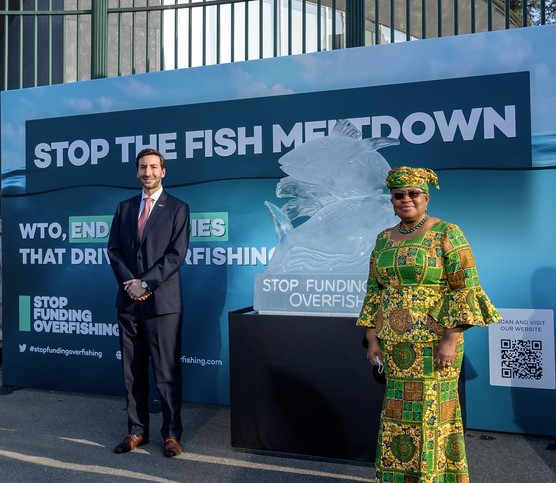
Since the negotiations were launched in 2001, negotiators have missed several deadlines to reach an agreement to end harmful subsidies, including the original 2020 SDG target date. Nigerian-American WTO Director-General, Ngozi Okonjo-Iweala, has expressed her strong desire to conclude the fisheries negotiations and sees this issue as a top priority which could, she hopes, lead to a revival of the WTO’s leadership role in complex global trade negotiations.
“I continue to have a strong sense of optimism that we will conclude these negotiations, notwithstanding the differences that we see still need to be bridged,” saidExternal link Okonjo-Iweala on June 30.
But to enter into force, the fishing subsidies agreement will need a consensus of all 164 trade ministers, followed by ratification by two thirds of WTO members. Since the creation of the WTO in 1995, only two new trade rules have been agreed: on Trade-Related Aspects of Intellectual Property Rights (TRIPS) in 2005 and on trade facilitation, in 2017. A quick agreement on something as complex and controversial as fishing subsidies may be unlikely.

In compliance with the JTI standards
More: SWI swissinfo.ch certified by the Journalism Trust Initiative










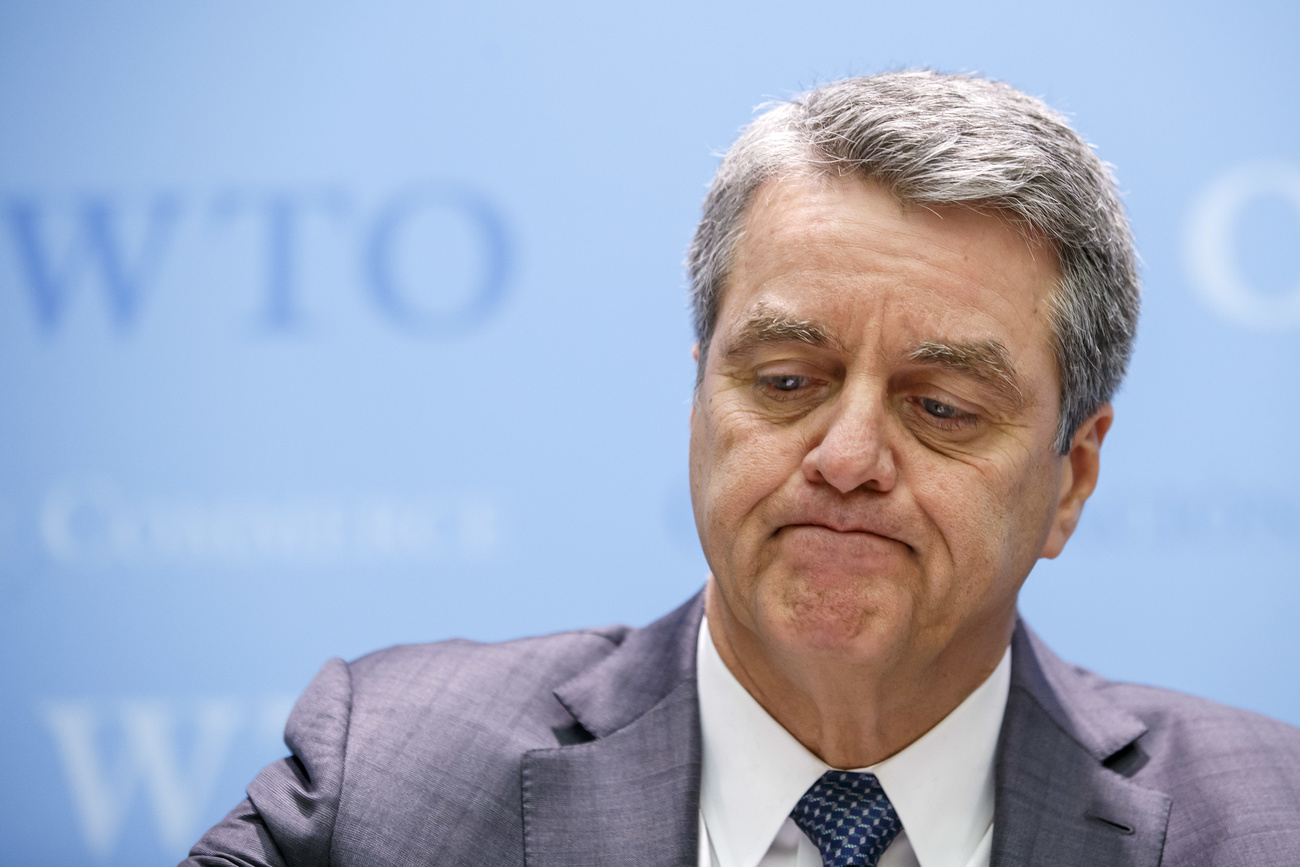
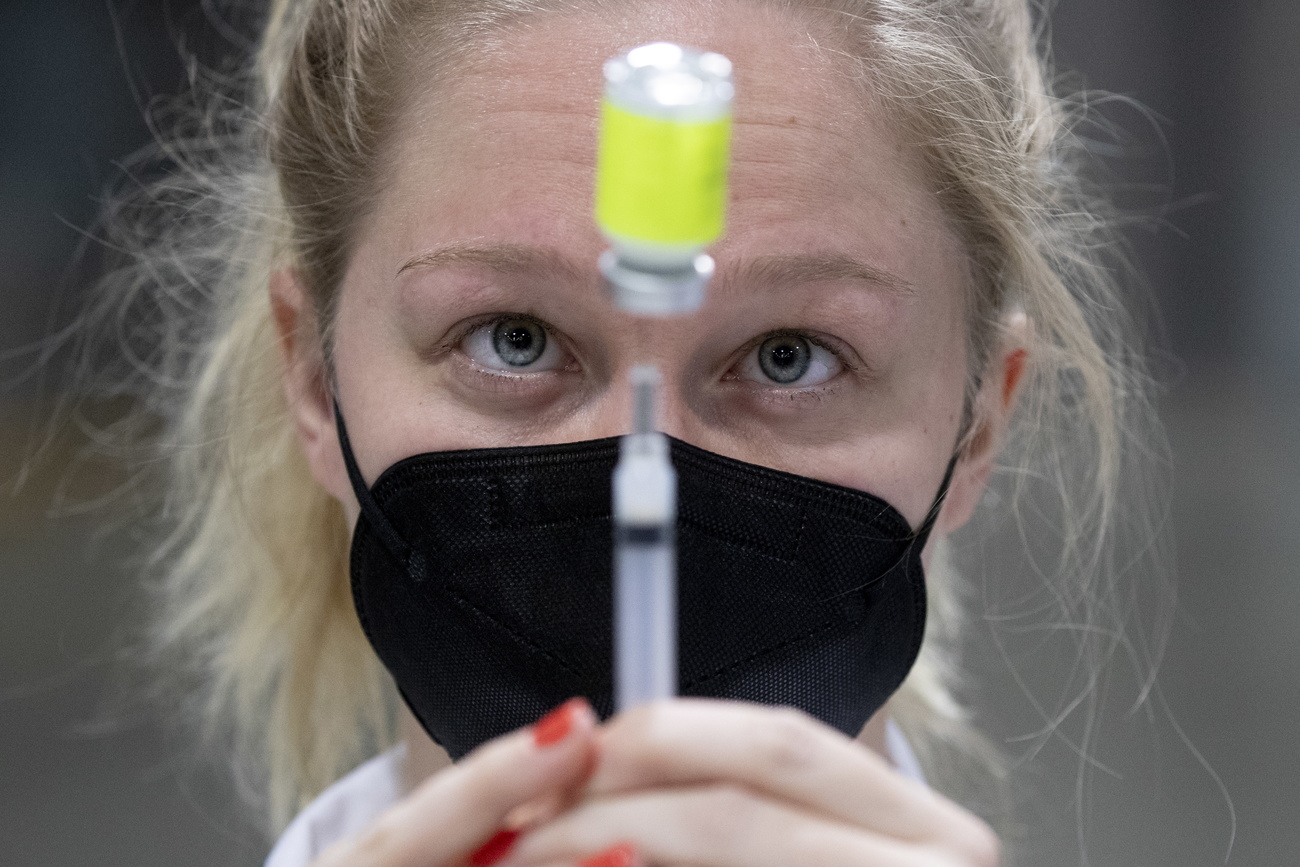
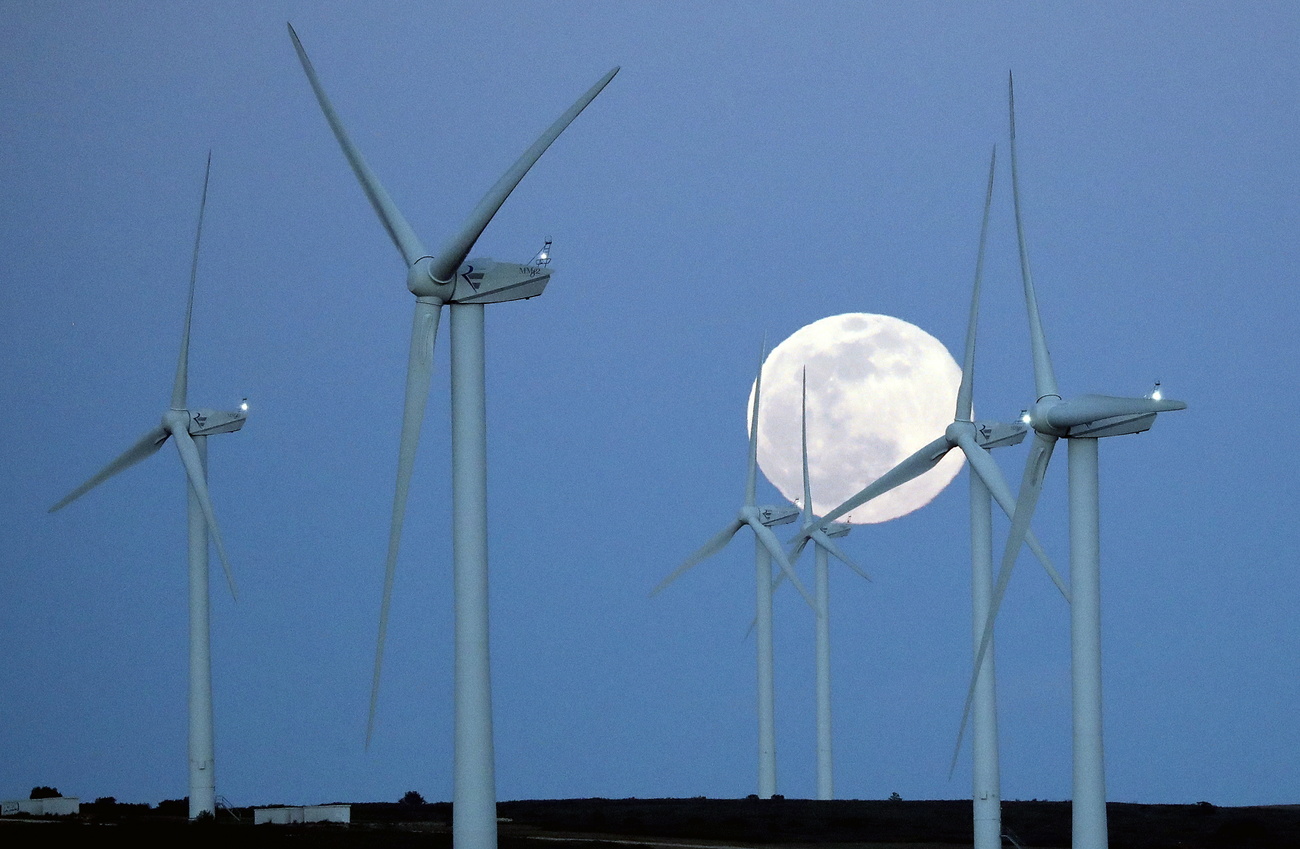

You can find an overview of ongoing debates with our journalists here . Please join us!
If you want to start a conversation about a topic raised in this article or want to report factual errors, email us at english@swissinfo.ch.